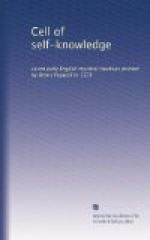For if a man have any presumption in his fantasies and in his workings, and thereby falleth in to indiscreet imagination, as it were in a frenzy, and is not ordered nor ruled of grace, nor comforted by ghostly strength, the devil entereth in, and by his false illuminations, and by his false sounds, and by his false sweetnesses, he deceiveth a man’s soul.
And of this false ground springeth errors, and heresies, false prophecies, presumptions, and false reasonings, blasphemings, and slanderings, and many other mischiefs. And, therefore, if thou see any man ghostly occupied fall in any of these sins and these deceits, or in frenzies, wete thou well that he never heard nor felt angel’s song nor heavenly sound. For, soothly, he that heareth verily angel’s song, he is made so wise that he shall never err by fantasy, nor by indiscretion, nor by no slight[173] of working of the devil.
Also, some men feel in their hearts as it were a ghostly sound, and sweet songs in divers manners; and this is commonly good, and sometime it may turn to deceit. This sound is felt on this wise. Some man setteth the thought of his heart only in the name of Jesu, and steadfastly holdeth it thereto, and in short time him thinketh that that name turneth him to great comfort and sweetness, and him thinketh that the name soundeth in his heart delectably, as it were a song; and the virtue of this liking is so mighty, that it draweth in all the wits of the soul thereto. Who so may feel this sound and this sweetness verily in his heart, wete thou well that it is of God,[174] and, as long as he is meek, he shall not be deceived. But this is not angel’s song; but it is a song of the soul by virtue of the name and by touching of the good angel.[175] For when a soul offereth him to Jesu truly and meekly, putting all his trust and his desire in Him, and busily keepeth Him in his mind, our Lord Jesu, when He will, pureth[176] the affection of the soul, and filleth it, and feedeth it with sweetness of Himself, and maketh His name in the feeling of the soul[177] as honey, and as song, and as any thing that is delectable; so that it liketh the soul evermore for to cry Jesu, Jesu. And not only he hath comfort in this, but also in psalms and hymns, and anthems of holy Church, that the heart singeth them sweetly, devoutly, and freely, without any travail of the soul, or bitterness in the same time,[178] and notes that




